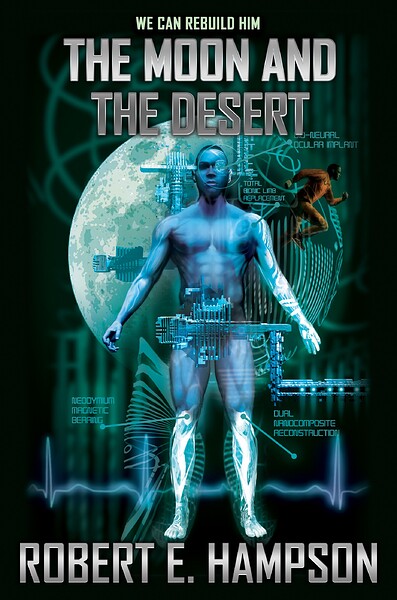Looking for a good read? Here is a recommendation. I have an unusual approach to reviewing books. I review books I feel merit a review. Each review is an opportunity to recommend a book. If I do not think a book is worth reading, I find another book to review. You do not have to agree with everything every author has written (I do not), but the fiction I review is entertaining (and often thought-provoking) and the non-fiction contain ideas worth reading.
Book Review
Cyborgs Are Human, Too
Reviewed by Mark Lardas
June 18, 2023
“The Moon and the Desert,” by Robert E. Hampson, Baen, 2023, 400 pages, $18.00 (Trade Paperback), $8.99 (Ebook)
Glenn Armstrong Shepard is determined to get to Mars. He was assigned to serve as the doctor on the 2041 mission to Mars. Then he got injured during a training exercise on the Moon. Badly injured; he lost both legs, an arm, an ear, and an eye. He does not intent to let that stop him, though. He still plans to go.
“The Moon and the Desert,” a science fiction novel by Robert E. Hampson tells Shepard’s story. He is a man with a mission, one determined to see it through.
He is a man who runs toward danger. He got injured rescuing another astronaut. He pulled the man out of a crashed Mars landing simulator, knowing he risked injury. Despite nearly fatal injuries he was patched together because he left instructions to do so, rather than standard DNR instructions.
Like the “Six-Million Dollar Man” series in the Seventies (which the book’s title is a nod to), Shepard is rebuilt with bionic prosthetics: legs, an arm, and an artificial eye and ear. The early parts of the novel trace his recovery. It is painful and involved. When it is finished he can function normally with better than human performance. The price is living with constant pain.
Living normally is not enough. He has to fight to regain his driver’s license and medical license. More, despite being invalided out of the Air Force, he wants to regain astronaut status and return to space. He needs to show the world he is more capable than before his injuries. As friends and backers help, he begins achieving those goals. He finds a love interest. He becomes a civilian astronaut, and returns to the Moon.
He is imperfect. He often feels sorry for himself. He is convinced that his ex-finance manipulates events to snatch what Shepard wants away from him, including replacing Shepard as mission surgeon on the Mars mission after Shepard’s accident. It is silly. One level he knows it is silly, but he cannot shake the belief.
Then something goes wrong during the Mars mission’s return to Earth. A rescue mission is required. Shepard knows he has to be on it.
“The Moon and the Desert” shows the human side of becoming a cyborg. An inspirational book, it shows the importance of humanity and of never giving up. Feeling down? Read this book. You cannot help feeling better afterwards.
Mark Lardas, an engineer, freelance writer, historian, and model-maker, lives in League City. His website is marklardas.com.
